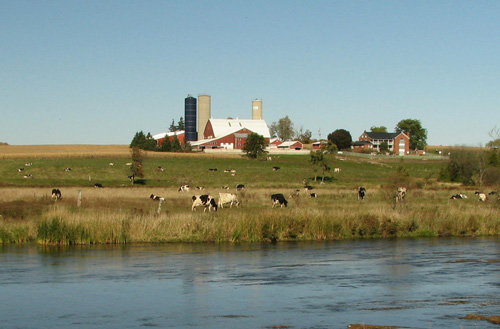
Reducing the carbon footprint of dairy farming in Canada is the goal of a research project led by Prof. Claudia Wagner-Riddle, School of Environmental Sciences (SES).
Farming is the second largest source of greenhouse-gas emissions after the energy sector. In Ontario, about one-third of agricultural emissions of global-warming gases in agriculture come from dairy farming, says Wagner-Riddle, although dairy’s contribution is much smaller nationally and globally.
Those numbers are only likely to increase, says the Guelph professor. With a growing human population, including more people in developing countries eating more animal protein, it’s important to find ways to produce more food in an environmentally friendly way.
“We have to produce food with a lower carbon footprint,” she says.
That’s the purpose of a four-year project she’s leading with $2.8 million from the federal Agricultural Greenhouse Gases Program. The five-year, $27-million initiative is intended to help develop on-farm technologies to mitigate greenhouse-gas emissions. Two U of G projects received nearly $4 million under the program, announced on campus earlier this fall.
The research team led by Wagner-Riddle will compile best management practices for dairy producers. She envisions a written guide with ideas for producers to track and reduce emissions, including emissions associated with producing feed for their livestock and with animal manure subsequently used in growing more crops. Earlier work has shown that cows fed varying diets produce different amounts of emissions.
“It’s a life-cycle approach,” she says.
The team – or, more likely, their grad students and post-docs – will haul an instrument trailer to several farms to record information. Those instruments will include devices that Wagner-Riddle has used before for measuring gases emitted from soil and manure, including methane, nitrous oxides and carbon dioxide. “We’re now including animals.”
Other members of the Guelph team are Prof. Bill Van Heyst, School of Engineering; SES Profs. John Lauzon and Kari Dunfield; Rob Gordon, dean of the Ontario Agricultural College; and Prof. Alfons Weersink, Food, Agricultural and Resource Economics. They will work with a researcher at the University of California (Davis) and consultants.
Also involved in the project are the Dairy Farmers of Canada, which will provide funding, and eight partners from the provincial government and producer organizations.
Before recommending best practices, the team plans to test various methods and technologies for reducing emissions. Although various technologies have been developed, scientists still need to test them on the farm. Wagner-Riddle hopes to provide baseline information to help farmers gauge likely impacts of any mitigation strategies.
She also hopes to help in developing possible financial incentives for producers.
She says general efficiency improvements already see dairy farms making more milk with fewer animals. That means the carbon footprint per litre of milk is already smaller than it was 20 years ago. Similarly, corn producers are increasing yields while making more efficient use of nitrogen fertilizers – another source of greenhouse-gas emissions.
With food demands increasing, producers will have to find ways to ramp up production even more while keeping their operations green. “We should be doing this in all sectors, not just dairy,” says Wagner-Riddle, adding that management practices developed here might also be useful in developing countries.
She studied agriculture at Brazil’s University of Sao Paulo before coming to Guelph for her PhD in land resource science.